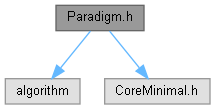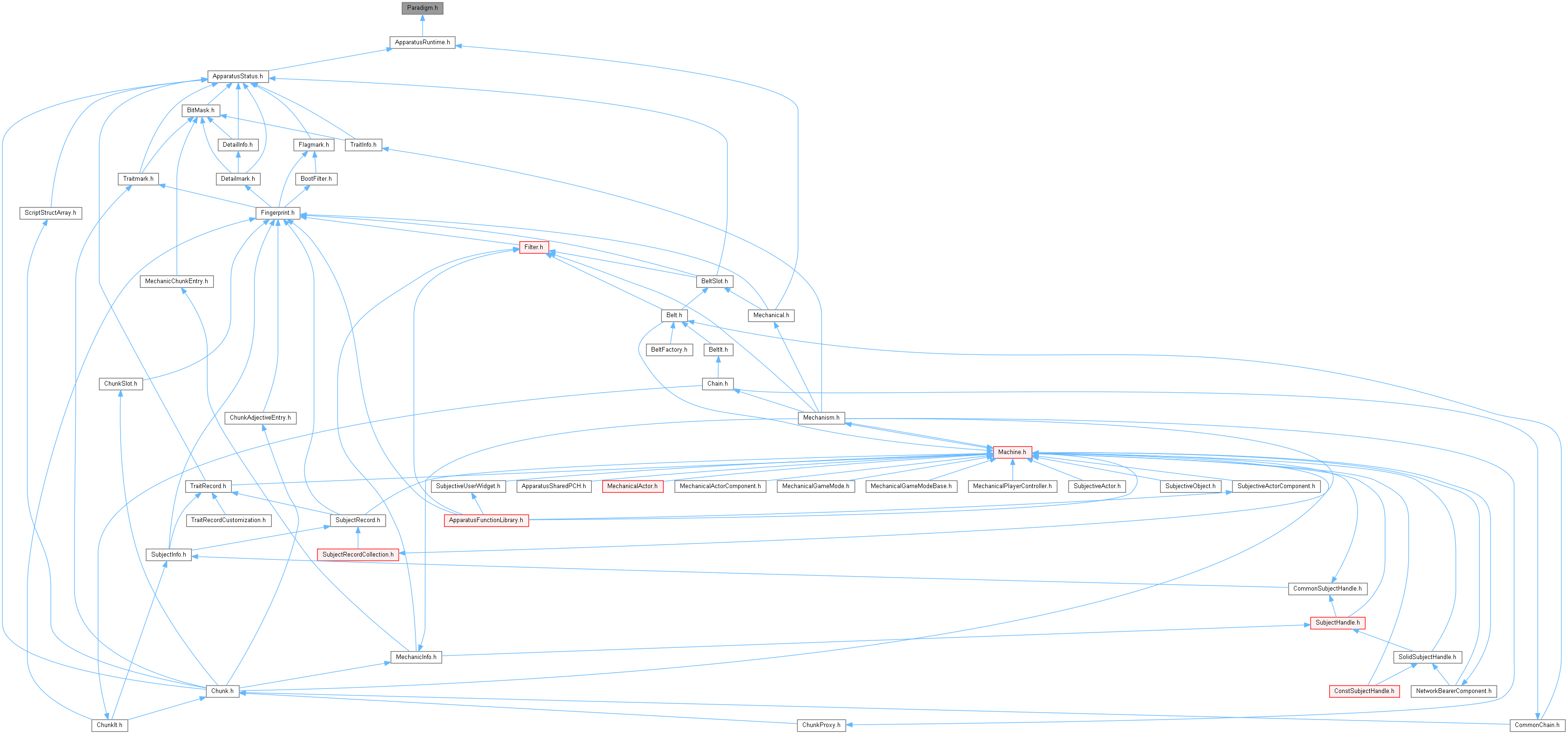|
Apparatus
Version 1.23
ECS data-oriented workflow for Unreal Engine.
|
|
Apparatus
Version 1.23
ECS data-oriented workflow for Unreal Engine.
|
The execution paradigm functionality. More...
#include <algorithm>#include "CoreMinimal.h"

Classes | |
| struct | FParadigmIndicator |
| The execution paradigm mark. More... | |
| struct | TParadigm< Paradigm > |
| A type wrap for the paradigm enumeration. More... | |
Typedefs | |
| using | FPoliteParadigm = TParadigm< EParadigm::Polite > |
| using | FPoliteSafeParadigm = TParadigm< EParadigm::PoliteSafe > |
| using | FHarshSafeParadigm = TParadigm< EParadigm::HarshSafe > |
| using | FPoliteUnsafeParadigm = TParadigm< EParadigm::PoliteUnsafe > |
| using | FHarshUnsafeParadigm = TParadigm< EParadigm::HarshUnsafe > |
| using | FDefaultParadigm = TParadigm< EParadigm::Default > |
| using | FDefaultBlueprintParadigm = TParadigm< EParadigm::DefaultBlueprint > |
| using | FPortableParadigm = TParadigm< EParadigm::DefaultPortable > |
| template<typename ParadigmT > | |
| using | TPoliteParadigm = TParadigm< MakePolite(ParadigmT::Value)> |
| Guarantee a paradigm to be polite. | |
| template<typename ParadigmT > | |
| using | THarshParadigm = TParadigm< MakeHarsh(ParadigmT::Value)> |
| Guarantee a paradigm to be harsh. | |
| template<EParadigm Paradigm, typename ResultT = EApparatusStatus> | |
| using | TEnableIfUnsafe = typename std::enable_if< IsUnsafe(Paradigm), ResultT >::type |
| Enable the method in unsafe mode only. | |
| template<EParadigm Paradigm, bool Condition, typename ResultT = EApparatusStatus> | |
| using | TEnableIfUnsafeOr = typename std::enable_if< IsUnsafe(Paradigm)||Condition, ResultT >::type |
| Enable the method in unsafe mode or in case of a condition. | |
Enumerations | |
| enum class | EParadigm { None = 0 , Auto = 0 , Polite = 1 , OptionsMask = 0x1 , Internal = 0x1 << 1 , HarshInternal = Internal , InternalHarsh = HarshInternal , PoliteInternal = Polite | Internal , InternalPolite = Internal | Polite , Unsafe = 0x2 << 1 , HarshUnsafe = Unsafe , UnsafeHarsh = HarshUnsafe , PoliteUnsafe = Polite | Unsafe , UnsafePolite = Unsafe | Polite , Safe = 0x3 << 1 , HarshSafe = Safe , SafeHarsh = HarshSafe , PoliteSafe = Polite | Safe , SafePolite = Safe | Polite , LevelMask = 0x3 << 1 , Default = HarshSafe , DefaultInternal = HarshInternal , DefaultPortable = SafePolite , DefaultBlueprint = SafePolite } |
| The type of paradigm for executing. More... | |
Functions | |
| constexpr EParadigm | operator+ (const EParadigm A, const EParadigm B) |
| Combine two paradigm into a single one. | |
| EParadigm & | operator+= (EParadigm &A, const EParadigm B) |
| Accumulate to a paradigm. | |
| template<typename... Ts> | |
| constexpr EParadigm | ParadigmCombine (const EParadigm DefaultParadigm=EParadigm::Default) |
| Combine all of the supplied paradigm types. | |
| constexpr bool | IsPolite (const EParadigm Paradigm) |
| Check if the paradigm is polite. | |
| template<typename ParadigmT > | |
| constexpr bool | IsPolite () |
| Check if the paradigm type is polite. | |
| constexpr bool | IsHarsh (const EParadigm Paradigm) |
| Check if the paradigm is harsh. | |
| template<typename ParadigmT > | |
| constexpr bool | IsHarsh () |
| Check if the paradigm type is harsh. | |
| constexpr bool | IsInternal (const EParadigm Paradigm) |
| Check if the paradigm is internal. | |
| template<typename ParadigmT > | |
| constexpr bool | IsInternal () |
| Check if the paradigm type is internal. | |
| constexpr bool | IsUnsafe (const EParadigm Paradigm) |
| Check if a paradigm an unsafe one. | |
| template<typename ParadigmT > | |
| constexpr bool | IsUnsafe () |
| Check if the paradigm type is unsafe. | |
| constexpr bool | IsSafe (const EParadigm Paradigm) |
| Check if a paradigm a safe one. | |
| template<typename ParadigmT > | |
| constexpr bool | IsSafe () |
| Check if a paradigm type is a safe one. | |
| constexpr EParadigm | MakePolite (const EParadigm Paradigm) |
| Guarantee a paradigm to be polite. | |
| constexpr EParadigm | MakeSafe (const EParadigm Paradigm) |
| Guarantee a paradigm to be safe (or more). | |
| constexpr EParadigm | MakeUnsafe (const EParadigm Paradigm) |
| Guarantee a paradigm to be unsafe (or less). | |
| constexpr EParadigm | MakeInternal (const EParadigm Paradigm) |
| Guarantee a paradigm to be internal. | |
| constexpr EParadigm | MakeHarsh (const EParadigm Paradigm) |
| Guarantee a paradigm to be harsh. | |
The execution paradigm functionality.
| using FDefaultParadigm = TParadigm<EParadigm::Default> |
| using FPoliteParadigm = TParadigm<EParadigm::Polite> |
| using TEnableIfUnsafe = typename std::enable_if<IsUnsafe(Paradigm), ResultT>::type |
Enable the method in unsafe mode only.
| Paradigm | The paradigm in question. |
| ResultT | The type of the return value. |
| using TEnableIfUnsafeOr = typename std::enable_if<IsUnsafe(Paradigm) || Condition, ResultT>::type |
Enable the method in unsafe mode or in case of a condition.
| Paradigm | The paradigm in question. |
| Condition | The condition to also check for. |
| ResultT | The type of the return value. |
| using THarshParadigm = TParadigm<MakeHarsh(ParadigmT::Value)> |
Guarantee a paradigm to be harsh.
| ParadigmT | The paradigm type to assess. |
| using TPoliteParadigm = TParadigm<MakePolite(ParadigmT::Value)> |
Guarantee a paradigm to be polite.
| ParadigmT | The paradigm type to assess. |
|
strong |
The type of paradigm for executing.
| Enumerator | |
|---|---|
| None | "Not an execution paradigm" identifier. Also serves the purpose of an automatic paradigm derivation. |
| Auto | A mnemonic synonym for EParadigm::None. |
| Polite | A flag to return statuses instead of firing assertion failures. |
| OptionsMask | The paradigm options mask. |
| Internal | |
| HarshInternal | Harsh internal paradigm. |
| InternalHarsh | Internal harsh version. |
| PoliteInternal | Polite internal version. |
| InternalPolite | Internal polite version. |
| Unsafe | Allows for direct access to the data even through non-solid subject handles. |
| HarshUnsafe | Harsh unsafe version. |
| UnsafeHarsh | Unsafe harsh version. |
| PoliteUnsafe | Polite unsafe version. |
| UnsafePolite | Unsafe polite version. |
| Safe | Disallowing direct data access for non-solid subjects. |
| HarshSafe | Harsh safe is just safe. |
| SafeHarsh | Safe harsh synonym. |
| PoliteSafe | Polite safe synonym. |
| SafePolite | Safe polite synonym. |
| LevelMask | The safety level mask. |
| Default | The default paradigm for public APIs. |
| DefaultInternal | The default paradigm for non-public APIs. |
| DefaultPortable | The default paradigm for maximum dynamic (virtual) APIs. |
| DefaultBlueprint | The default paradigm for Blueprint APIs. |
|
inlineconstexpr |
Check if the paradigm type is harsh.
| ParadigmT | The paradigm type to examine. |
Check if the paradigm is harsh.
| Paradigm | The paradigm to examine. |
|
inlineconstexpr |
Check if the paradigm type is internal.
| ParadigmT | The paradigm type to examine. |
Check if the paradigm is internal.
| Paradigm | The paradigm to examine. |
|
inlineconstexpr |
Check if the paradigm type is polite.
| ParadigmT | The paradigm type to examine. |
Check if the paradigm is polite.
| Paradigm | The paradigm to examine. |
|
inlineconstexpr |
Check if a paradigm type is a safe one.
| ParadigmT | The paradigm type to examine. |
Check if a paradigm a safe one.
| Paradigm | The paradigm to examine. |
|
inlineconstexpr |
Check if the paradigm type is unsafe.
| ParadigmT | The paradigm type to examine. |
Check if a paradigm an unsafe one.
| Paradigm | The paradigm to examine. |
Guarantee a paradigm to be harsh.
| Paradigm | The paradigm to alter. |
Guarantee a paradigm to be internal.
| Paradigm | The paradigm to alter. |
Guarantee a paradigm to be polite.
| Paradigm | The paradigm to alter. |
Guarantee a paradigm to be safe (or more).
| Paradigm | The paradigm to alter. |
Guarantee a paradigm to be unsafe (or less).
| Paradigm | The paradigm to alter. |
Combine two paradigm into a single one.
The safest level will get propagated.
| A | The first paradigm to combine. |
| B | The second paradigm to combine. |
Accumulate to a paradigm.
The safest level will get propagated.
| A | The first paradigm to combine and receive the result. |
| B | The second paradigm to accumulate. |
|
inlineconstexpr |
Combine all of the supplied paradigm types.
| Ts | The paradigm types to combine. The non-paradigm types are silently ignored. |
| DefaultParadigm | The default paradigm |